#clemency
Text
The 50th anniversary of AIMs (American Indian Movement's) occupation at Wounded Knee is coming up, so the Lakota People's Law Project is leading another push to free an AIM activist who was wrongly convicted of killing two federal agents in 1975- Leonard Peltier. He was convicted on false evidence and false testimony and sentenced to two life sentences. He is now 78.
LPL has a formatted email up on their website now which you can personalize and send to Biden to ask for clemency. (Please personalize emails like this so it doesn't get filtered as spam. Just move some words around, add some, take some, you don't have to write a whole email.) Please pass this around.
#leonard peltier#aim#american indian movement#leonard peltier defense committee#wounded knee#protest#occupation#political prisoners#petition#president biden#clemency#action#lakota#ojibwe#advocacy#native rights#indigenous people#legal action#federal prison#indian boarding schools#boarding school#history#bishop desmond tutu#nelson mandela#dalai lama#chase iron eyes#legal defense#activists
3K notes
·
View notes
Text
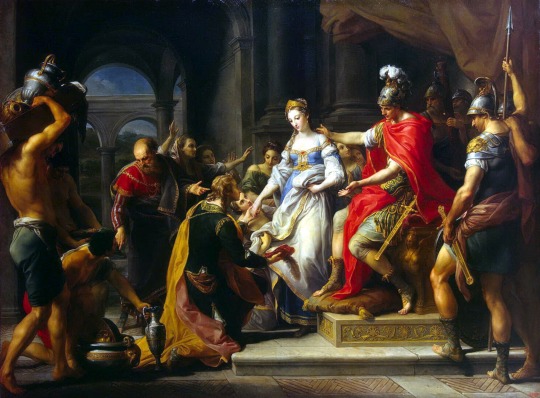
The Continence of Scipio by Pompeo Batoni
#scipio#art#pompeo batoni#publius cornelius scipio#scipio africanus#allucius#clemency#continence#ancient rome#roman#romans#roman republic#second punic war#punic wars#spain#hispania#iberia#iberian peninsula#cartagena#carthage#carthaginian#antiquity#rome#europe#european#history#livy#celtiberian#prince#titus livius
37 notes
·
View notes
Note
Do you think alexander considered hephaistion his alter-ego?
"He, too, is Alexander"
Did Alexander think of Hephaistion as his alter-ego? Quite possibly—but not by that term. For one thing, “alter-ego” is Latin, and we find it first used in writing by Cicero, although it may have been (quite possibly was) in common parlance prior.
The concept did appear to exist in Greek, but the tendency to apply it to Alexander and Hephaistion owes chiefly to two attestations. The first is the recorded meeting between Alexander, Hephaistion, and Sisygambus, wherein he supposedly said, of Hephaistion, "He, too, is Alexander." The other concerns a quip attributed to Aristotle, mentioned in Diogenes Laertus that friendship is one soul in two bodies—but this not found Aristotle's surviving works, despite a longish passage on friendship in his Nikomachian Ethics.
Without being unduly cynical, we must always take exact phrasing with a grain of salt. I think there's very little we can be certain Alexander said. Same problem with Aristotle, unless you're reading his actual writings, and even some of those are dubious, such as the infamous Ath Pol, or Constitution of the Athenians. We typically distinguish these as “pseudo-Aristotle.” (So if you see “pseudo-”some-name, that means the work is attributed to that person but almost certainly not actually written by him/her.)
So, as part of my usual ‘Let me ‘splain you why you can’t trust that story/saying…,’ let’s play some dating games here.
First, Cicero is our initial attested use of “alter ego,” in a letter to his friend Atticus, that dates the phrase to somewhere between 68-44, or middle of the first century BCE. Maybe we can push it back a little earlier to the early first century, but I’d be uncomfortable pushing it further without solid evidence. Popular terms change. Anybody call a fashionable (male) person, “That cool cat…” these days—except as a bit of a joke? I didn’t think so. 😉 But “cool” itself is otherwise still in common use. So we have to be careful about when terms are popular.
Now, the story of Alexander before Sysigamgus is best known from Curtius (3.12.16-17), but Diodoros also relates it (17.37.5-6), and so does Arrian (2.12.3-8)—although with a caveat. He says it doesn’t appear in his trusted sources (Aristoboulos or Ptolemy) but he tells it anyway, apparently because he approves of the actions in it.
We don’t know where it comes from. Maybe Kleitarchos? Possibly Kallisthenes? It does not appear in either Plutarch’s bio of Alexander or his Moralia, although normally he loved these sorts of anecdotes. There’s a good reason, however, that Plutarch doesn’t tell it (see below). Justin is just too short. (It also appears in abbreviated form in a couple of later Roman sources, Valerius Maximus and Dio Chrysostom. So it was clearly popular in the rhetorician crowd.)
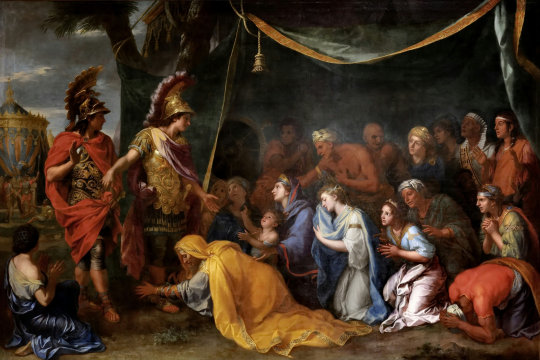
So, what are the words attributed to Alexander? Diodoros’ Greek is kai gar kai outos Alexandros estin: “and for also this [man] Alexander is” (6). Arrian renders it kai gar ekeinon einai Alexandron: “and for that man is Alexander” (7). Curtius puts it, albeit in Latin, nam et hic Alexander est: “for he also Alexander is” (17). Yes, I rendered those into English pretty exactly, even if it sounds a bit funny. First, it helps show how every translation is an interpretation, but also allows us to watch the parsing itself.
None of them is exactly the same, even if the meaning is the same. That’s a good reminder we don’t have his exact phrasing!
Assuming the event even happened.
Why should we doubt it? Aside from Arrian’s skepticism?
This story feels a LOT like a classic lesson in proper clemency. I’ve talked about the importance of clemency before. The bulk of this tale is meant to show a chivalrous Alexander early in his career, before he fell victim to divine aspirations and the lure of that nasty Oriental Luxury <tm>. See what a good guy he was?! Plutarch, in his take, insists not only did Alexander not rape the royal women, he wouldn’t even look at the women. That’s probably why he doesn’t tell this story, because going to their tent absolutely IS looking at them, donchaknow. It’s even funnier because it’s Plutarch who tells us Statiera died in childbirth well, well after that baby could have been Darius’s. (Consistency? What consistency? Pfff.)
My point here is that the story may very well have been fabricated to make a MORAL point of how to be an honorable victor—whether in the era of the Successors (which grew increasingly bloody and vicious), or in the later Roman period. It would also provide a perfect example for Curtius to contrast with Alexander’s later Asian debauchery.
You may be wondering, But why would they make up an entire story like that? Wouldn’t people know?
Um, to prove my point I give you…Twitter, QAnon, and whatever quote is being attributed (wrongly) to Samuel L. Jackson this week. The more often people hear something, even a lie, the more likely they are to believe it’s true. Arrian’s other stories of after-Issos events has Leonnatos going to talk to the women, not Alexander (and Hephaistion). Of course, it’s entirely possible Leonnatos went the first evening, while Alexander and Hephaistion went the next morning. It even makes a certain amount of sense that he’d visit the royal women. So, the bare-bones of the encounter may be true, but mistaken identities and all those speeches were likely put in people’s mouths later.
Incidentally, there’s a pun in the line, as alex-andros translates to “protector of men.” So Hephaistion is also a protector of men. Romans and Greeks ate up that sort of word-play.
As for the Aristotle titbit…Diogenes Laertus reports a list of “sayings” (aphorisms) attributed to various philosophers. For Aristotle, one is: “To the query, ‘What is a friend?’ his reply was, ‘A single soul dwelling in two bodies’” (5.20). I’ve seen people claim he was referencing Alexander and Hephaistion. There’s absolutely no reason to assume that except romanticism and an Alexander-centric view. In our surviving writings by Aristotle, he barely mentions Alexander.* Shock, I know. 😂 But Alexander wasn’t at the forefront of his mind.
Additionally, as I said above, we have a longish bit on friendship in the Nikomachian Ethics, where that definition doesn’t appear, although nothing he says about true friendship in it contradicts the quote, either. But “Sayings of…” were a popular form of literature in antiquity, and sometimes a clever quip got attributed to more than one person! Maybe Aristotle did say that, but it’s not in actual writings about friendship by Aristotle. Aristotle’s writings on friendship are rather more complex; he lists three types of friendship in Book VIII.
Anyway, this little in-depth study is meant to help folks see how complicated it can be, to get back to what ALEXANDER himself said, thought, or even did.
Yet one thing ALL the sources agree upon: Hephaistion was Alexander’s favorite, not just (or even primarily) as a commander, but as a person. I’ve never read any claim to the contrary, and I have (quite literally) read everything in the ancient sources that concerns Hephaistion (and most everything that concerns Alexander too).
So, while it’s impossible to say that Alexander considered Hephaistion an “alter-ego,” or ever called him “Alexander too,” you can rest assured that every ancient source agrees that Hephaistion was dearer to Alexander than anybody else, maybe even including his own mother.
—————-
* 391a2: his “On the Universe” treatise opens with a reference to “Alexander,” who I think it’s safe to assume is the king. And 1420a5, is “Rhetoric to Alexander”--except that treatise is widely understood (even in the medieval world) to be bogus: e.g., a "pseudo-Aristotle" text. Plus Alexander is mentioned in a couple fragments.
#asks#alter-ego#Alexander the Great#Hephaistion#Hephaestion#Cicero#Alexander before the family of Darius#Sisygambus#He is Alexander too#Aristotle#clemency#Classics#Alexander the Great in Roman literature#tagamemnon
26 notes
·
View notes
Link
Chapters: 13, Words: 46,654
Rating: Explicit
Relationships: Aemond "One-Eye" Targaryen/Lucerys Velaryon
Additional Tags: Alternate Universe - Canon Divergence, Mutual Pining, Slow Burn, Explicit Sexual Content, Major Character Injury, Angst with a Happy Ending, This leans very Team Black, Ambiguous Age, POV Second Person
Summary: Aemond Targaryen has always wanted a friend. He's held hope that his nephew, Lucerys, would be that friend, but older brothers and family squabbles have never let that happen. As time goes on and arguments over succession turn into full scale war, Aemond has two options: choose his brother knowing it could kill his beloved nephew, or choose his sister knowing he will become a traitor.
You are Aemond. You see his choices and his mistakes through his eyes. You feel his pain and his longing. You learn to love and you learn to forgive, but you are always yourself.
14 notes
·
View notes
Text

In honor of officially starting this new campaign, everyone look at my silly
Image Description: a digital drawing of Clemency, a green tiefling with long, wavy, black hair and grey horns. They're wearing a long white cloak, black pants, and brown shoes. Their tail peeks out from behind them. They're on an orange background with a soft yellow ring of light behind their head. The image is framed in a pale peach frame, text below the image reads "The Fool"
End description
#rip (reeses in pieces)#reese does art#clemency#oc talk#yeah yeah yeah tarot inspired art of a dnd character we know#loosely inspired because poses are hard#but i love clemency :3#also their arms are just inside their cloak i got fed up with this piece ksldfjsdlf#i did it a few months ago and i wanna redo it already#dnd character#embers of aaghmr
13 notes
·
View notes
Link
Peltier has already served a longer sentence than most principals in murder convictions. There is no way to look at the evidence and come away with any conclusion other than Peltier is being punished for crimes that could not be proven beyond a reasonable doubt in a court of law.
#Leonard Peltier#political prisoners#Indigenous#AIM#FBI#clemency#racism#repression#Joe Biden#frame-up
40 notes
·
View notes
Text

To start off this blog:
DA-1712-5650-3922, dream address for Clemency, my archived island. It's not perfect, but it's a mixture of elegant and weird themes that are very me.
8 notes
·
View notes
Text

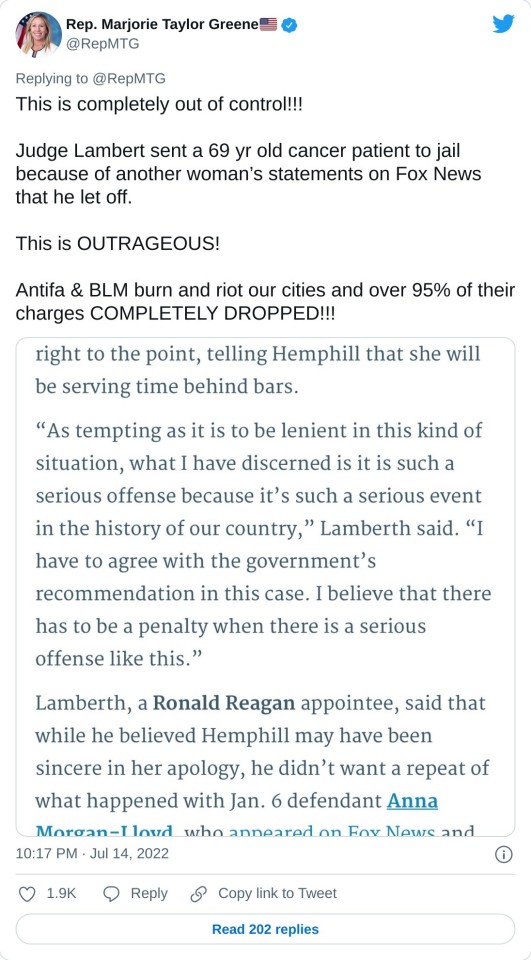

☹😥😥😭😭
108 notes
·
View notes
Note
🩵🤍
for. >:3 clemfalynastarion >:3
EXCELLENT TY
🩵 Who does what chores? Which chore do they both avoid?
falyn cooks, clem cleans, astarion drinks wine and heckles; clemfalyn have exactly the same taste in chores (do NOT want to fold the laundry) but clemmy's martyr complex means that they end up picking up the slack
🤍 What is their favorite or most admired quality in the other?
if asked, falyn would say clem's sense of humour: in reality, they're probably the first person in the world she actually trusts and relies on, and as someone who's spent most of her life alone and entirely self-reliant that's more important to her than she'll ever be able to actually express:3
for clem, falyn is a grounding influence; she's the pragmatic side of the relationship, and a non-emotional counterpoint to the higher-strung partners who love an emotional spiral<3
also they both think the other guy is the coolest guy in the room
#ikarons#clemency#falyn#my babies..........#beautiful codependent platonic soulmates who share a boyfriend
2 notes
·
View notes
Text
#5758
A brave bird soars
As a legacy of dinosaurs.
May its great vibrancy
Bring clemency.
2 notes
·
View notes
Text

dreamscape
2 notes
·
View notes
Note
*bounces up and down* I wanna know about your OCs!! :D But tomorrow. You should sleep first because you are sleepy and it's late lol
hi hello this is several tomorrows later ! but I'm gonna talk abt the blorbos from my head under the cut <3
So my girl vapor is a current dnd pc of mine! she's a water genasi rogue and has had a Rough Life. classic rogue stuff, super melodramatic background, and she's just like. not very good at being a rogue but the campaign she's in is actually wrapping up this week and i'm very excited to give her a gentle retirement <3
I'm also using sterling kestrel in another campaign! he's a human monk, he's the greasiest short king ever and he's dumb as a rock <3 he had a pretty good family life, he owes his life to a wizard, and has been tasked with protecting this wizard's son (and maybe the wizard's son had to do death saving throws last session but he's fine !)
Nox Eastmoore is the pc i'm using in a campaign that's starting soon !!! they are a drow wizard (necromancer now but originally enchantment) so Nox had a nice family life, no siblings but nice parents and a lot of friends growing up! they went to an arcane school when they were about 100 or so? there they met Eden, an elven divine soul sorcerer. He and Nox became fast friends and then More (ofc) but while they were planning their future, a heinous plague ravaged the world. Eden, fearing for the safety of his family, did leave the school with a promise to Nox that he'd be back soon. the pair actually did exchange lockets with locks of each other's hair in it, they weren't quite ready for rings.
Eden wasn't back soon. Nox received a letter from Eden's family saying that he succumbed to the plague. He reportedly had a closed casket funeral. Nox was unable to attend. Once the plague subsided, Nox returned home, burned their spellbooks, and swore off magic. but time went by and they couldn't give up on Eden. they returned to orenda island, to the arcane school they had previously attended, and began their studies as a necromancer.
i do also have ideas for clemency jones, a tiefling death domain cleric who's loyal to the raven queen, and then oliver whimbley, a mild-mannered high school biology teacher who does unethical experiments on the weekends <3
#rip (reeses in pieces)#tentatively-positive-3#oliver is a motw character [the flake] but i might just start writing stuff for him#nox is my baby atm i love them and i cant wait to see if eden is actually dead or not sldfkjsdlfkds#this was a Lot so thank you gab!!#ocs#vapor#nox eastmoore#clemency#sterling kestrel#oliver whimbley#asks#also enjoy their pin boards and playlists [if applicable]
6 notes
·
View notes
Text
Alfre Woodard Filmography Part 3

My Own Worst Enemy (2008)

Three Rivers (2009‑2010)

Grey's Anatomy (2011)

True Blood (2010-2012)

Steel Magnolias (2012)

Annabelle (2014)

State of Affairs (2014‑2015)

The Last Ship (2014-2015)

Luke Cage (2016‑2018)

Clemency (2019)
#alfre woodard#My Own Worst Enemy#Three Rivers#Grey's Anatomy#True Blood#Steel Magnolias#Annabelle#State of Affairs#The Last Ship#Luke Cage#Clemency
7 notes
·
View notes
Note
In a fictional setting, how do you think Alexander would react to defeat? Let's say some guy, who wasn't a warrior, stood up to Alexander and said "You will not defeat us. We will not become slaves!" He's convinced everyone Alexander runs a slave state, and this is a fight against tyranny (not exactly true but it sells). Unlike Darius, he never retreats. In short if Alexander was defeated in battle, would this enrage him, or would he seek to recruit this person? What if the person said no?
Alexander and Resistance/Insurgency
This question is modern in some fundamental ways. That’s not a slam, but is an important point. It poses a situation that speaks to modern ideals rather than ancient conceptualizations.
Thing is, this happened quite a lot. It defines much of the conflict Alexander experienced in India as he moved down the Indus River. Also earlier, in Baktria-Sogdiana.
Alexander inevitably beat the crap out of the rebelling group, butchering anybody he perceived as a rebel. Why he won (however Pyrrhic the victory) is that he refused to give up, perceiving resistance to him as defiance that must be eliminated. It’s not a pretty picture.
So, let’s break down the question.
“Slave state” is a modern concept, and nothing like an abolitionist movement existed then.
Slavery was ubiquitous: so fundamental, ingrained, and assumed that slaves might own slaves, who might own slaves. By the Roman imperial period, slaves could be wealthy, especially skilled slaves. Generally, slavery was regarded as a result of ill fortune, disfavor of the gods, or even inherent inferiority (the beginnings of scientific racism, rooted in geographic determinism).
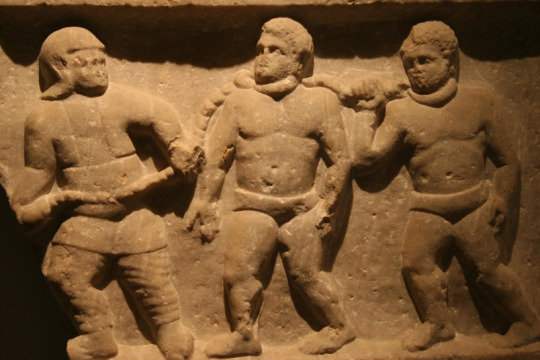
Did people want to become slaves? Of course not. Did entire populations resist conquest, choosing to die rather than become slaves? Absolutely. Was a fight against “tyranny” not used as a battle cry? It absolutely was.
But in ATG’s day, nobody would frame it as fighting a slave state. Even later slave revolts such as the Third Servile War [e.g., Spartacus’s Revolt] shouldn’t be understood as a philosophic fight against the institution of slavery so much as one slave who’d had enough. No “movement” arose from it. (Forget the 1960s Spartacus.)
The goal was to avoid becoming a slave yourself. It’s important to understand how resistance to conquest was framed. Claiming ATG ran a “slave state” would carry no weight. Everybody was a slave state, even if (by modern definitions*) that’s not technically true.
We know how ATG reacted to defeat: he viewed it as temporary—and made it so. We see this in sieges like Halikarnassos, Tyre. He just keeps pounding you. Not unlike Rome. Beat them and they come back, and beat you the next time. He learned from his defeats. As a battle commander, he was nothing if not agile. The worst defeat the army suffered was the massacre at Marakanda in Baktria (led by Spitamanes). In fact, he was mostly losing in Baktria, until he figured out why the resistance was occurring, then married his way to peace.

Ultimately he succeeded because he figured out how to win, then did whatever it took.
In India, things got even uglier. Lots of resistance as he made his way south down the Indus, especially from the Brahmins. He just mowed them down. But! If people surrendered, he granted clemency and didn’t kill them. That bad cop/good cop routine worked (mostly). But success was temporary. After his death (and perhaps even before), areas of India went back into revolt, with the (curious) exception of Poros, who he defeated at the Battle of the Hydaspes but subsequently befriended due to his bravery on the battlefield. BUT also because he surrendered.
This brings me to the concept of conquest and clemency. Equality was not a thing, even in a democratic state like Athens. It was still all about proving your exceptionalism. Ethnocentrism was universal and “Live and let live” not a concept most ancient cultures would have understood.
Yes, people regularly fought to maintain their freedom and independence, but loss was routinely interpreted as having the gods against you, and/or “natural” weakness. Victory meant “I’m better than you,” either due to divine favor or natural superiority. A sort of schoolyard mentality. Worth was proven by success. Alexander very much subscribed to this. He believed himself the son of Zeus-Ammon in part because he kept winning. Ergo, the gods were on his side.
Therefore, to quote Apollo 13, “Failure is not an option.”
Yet tucked inside all that—the inherent tension—was admiration for courageous resistance. This was also important to Alexander. He wanted to win a fair fight and have that acknowledged, as it meant (again) divine approval. If he felt somebody was cheating, or cowardly, he just got angry. This also defines his reaction to those who surrendered, only to resist later. To him, they’d broken a sacred contract.
And that brings me to Poros, why ATG went from War to Besties with the man. To Alexander, the conflict wasn’t personal, but about conquest, which meant, “We’re here to prove who’s better by right of combat.” When Porus fought bravely, lost, then surrendered: that was the script ATG wanted! Why? It let him be magnanimous in his victory. He returned Poros’s kingdom to him and added another kingdom as well!
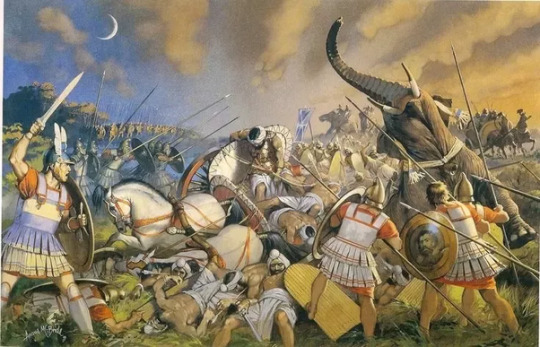
But note something here: who’s the giver? Alexander. That’s what clemency was: a grant of grace to somebody below you in the pecking order. This isn’t an alliance, no meeting of equals. Alexander GRANTS favors.
That means he cannot accept defeat. As long as he was on top, he wasn’t a terrible overlord, comparatively—assuming he cared enough to pay attention (his main failing as a ruler). But you may not resist (win). Victory = divine approval. Defeat = loss of divine approval.
Unacceptable!
At least some Indian nations figured this out pretty quickly and used it to their advantage. They discerned he was just sweeping through the region and had no plans to stay, so “surrendered” or claimed some connection to Herakles or Dionysos, flattered him, and he passed them by, maybe even gave them gifts. If the swathe he cut through the Indus Valley was often bloody, it wasn’t entirely bloody. Much depended on how the locals played him. Further, if prior Persian attempts to hold the Indus gave any example, they could “surrender,” pat ATG on the head, send him on his way…and he’d probably never be back to bother them again.
But in short, we have a lot of examples of the situation you outline here, and absolute defiance was always met by ruthless extermination. The further ATG went, the more resources he had to draw upon, so (as with fighting the Assyrian army) it was virtually impossible for smaller groups to stand up to his army. The Hydaspes was ATG’s victory in large part because of a discrepancy in troop numbers. He still fought a brilliant battle (maybe his most clever), but faced a much smaller army than at Gaugamela.
YET had he continued into India to face larger nations, he’d not have been so successful, imnsho. And even the fading glory of the divided Zhou Dynasty in China might have rolled him up and spat him out, with his much-reduced Macedonian core. He didn’t head back west for shits and giggles and a mutiny. He had good scouting, and Poros now on his side…whose fortune it benefitted to convince ATG to go back west. So, he cut his losses and marched south.
But this gives you some context for the question. Alexander both did not accept loss, and also had enough savvy to get himself out of—or avoid facing altogether—situations that he couldn’t win.
__________________________________
* In modern parlance, a “slave state” is one in which slavery is required for economic survival. Otherwise, it’s a state (or nation) that practices slavery. In the ancient world, due to the relatively small number of slaves per household in most places, plus a category of “serfs” (such as mushkênu in Mesopotamia), defining slave states is tough. There are some. Ancient Sparta was a slave state: without the helot system, it collapsed. Rome was a slave state. But most of ancient Greece was not, and certainly not ancient Macedonia. We might consider slavery key to certain professions: mining, prostitution, but it’s hard to argue the entire society would collapse without those slaves.
That said, east to west, south to north, slavery was everywhere. Nobody questioned it, they just wanted to own the slave, not BE the slave.
#asks#Alexander the Great#Alexander and defeat#clemency#conquest#slavery in the ancient world#Classics#tagamemnon#Resistance to Alexander the Great#Alexander the Great in India#Porus#Poros
14 notes
·
View notes
Text
New fic will drop this week! I gotta clean it up just a bit more but it's almost ready :)
5 notes
·
View notes
Text

your party comes across four feathers at a misty crossroads, wyd?
Image description: a digital drawing of four black feathers placed beside each other. The background is light blue mottled with grey and white. Above the feathers is a grey Roman numeral four, beneath the feathers is handwritten text that reads "Four of Wands"
End description.
#rip (reeses in pieces)#reese these are feathers not wands I KNOWWWWW let me do more taroty stuff#reese does art#clemency#technically#embers of aaghmr
9 notes
·
View notes